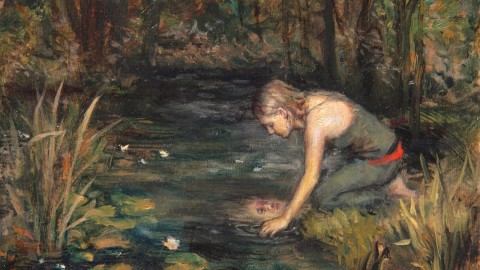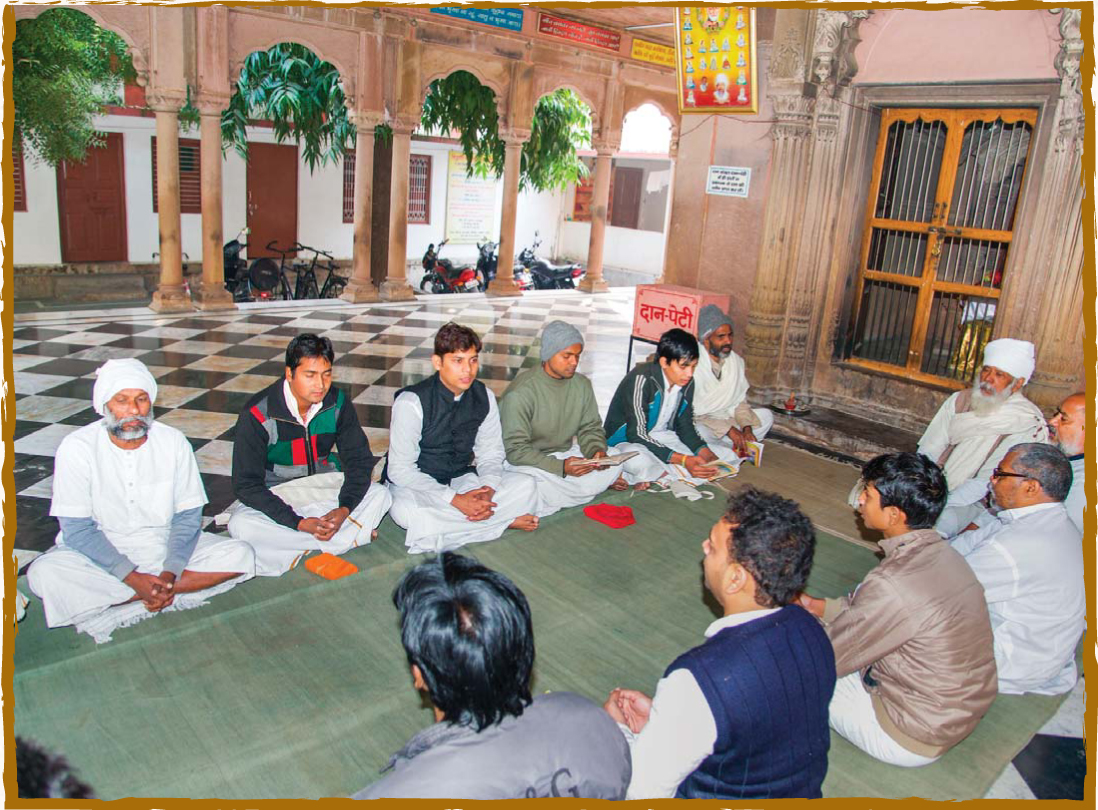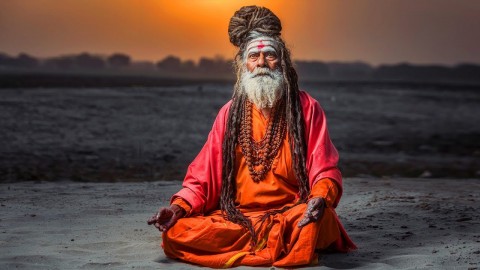Before we enter into this sutra, first we will understand The Seeds Of Misery.
THE ORDINARY humanity can be divided into two basic types: one is the sadist and the other the masochist. The sadist enjoys torturing others, and the masochist enjoys torturing himself. The sadist is of course attracted towards politics. There, there is the possibility, the opportunity to torture others. Or, he is attracted towards scientific research, particularly medical research. There, there is the possibility in the name of experiment, to torture innocent animals, patients, dead and alive bodies. If politics is too much and he is not so certain about himself, or not intelligent enough to move into research, then the sadist becomes a schoolmaster; he tortures small children. But the sadist always moves, knowingly or unknowingly, towards a situation where he can torture. In the name of country, in the name of nation, society, revolution, in the name of truth, discovery, in the name of reformation, of reforming others, the sadist is always in search of an opportunity to torture someone.
Sadists are not very attracted towards religion. The other type is attracted towards religion, the masochist. They can torture themselves. They become great mahatmas, they become great saints, and they are revered by the society because they torture themselves. A perfect masochist always moves directly towards religion, just as a perfect sadist moves towards politics. Politics is the religion of the sadist; religion is the politics of the masochist. But if a masochist is not too certain, then he can find some other sub paths. He can become an artist, a painter, a poet, and can allow himself to suffer in the name of poetry, literature, painting.
You must have heard the name Vincent Van Gogh, the great Dutch painter. He was the perfect masochist. If he had been born in India, he would have become a Mahatma Gandhi; but he became a painter. He had not much money. His brother used to give him only enough to survive. Out of the seven days of the week, he would eat only on three days, and the other four days of the week he would fast in order to paint.
He was in love with a woman, but the father of the woman wouldn’t allow him to see her. So he forced his hand on a burning flame and he said, ‘I will keep my hand on the burning flame until you allow me to see her.’ He burnt his hand.
A prostitute told him, ‘Your ears are very beautiful,’ because there was nothing else to appreciate in his face. He was one of the ugliest men, he had ugly features.
The prostitute must have been in difficulty with this man, so she told him that his ears were very beautiful. He went back home, cut one of his ears off with a knife, packed it, went back to her with blood flowing all over, and presented the ear to the woman saying, ‘You liked it so much that I would like to give it to you as a gift.’
He continued painting in the hottest part of France, Arles, in the summer when the sun was very hot. Everybody told him, ‘You will get ill, the sun is too hot.’
But the whole day, particularly when the sun was hottest, at full noontide, he would be standing in the fields and painting. Within twenty days he went mad.
He was young, thirty three or thirty four when he killed himself, committed suicide.
But in the name of painting, art, beauty, you can torture yourself. In the name of God, in the name of prayer, in the name of sadhana, you can torture yourself.
You will find this type very predominant in India: lying on a bed of nails, thorns, fasting for months. You will come across people who have not slept for ten years.
They remain standing, fighting with sleep. There are people who have been standing for years, they have not taken any other posture; their legs are almost dead. There are people who are living with one hand raised towards the sky; the whole hand has gone dead, no more blood circulates in it, it is just bones. These people are ill; they need treatment. But thousands are attracted to them.
All of your politicians, Adolf Hitler or Joseph Stalin or Mao Tse Tung, need treatment. And all of your Mahatmas need treatment also, because a man who is interested in torturing himself or others is ill, deeply ill. To be interested in torture, either of the other or of oneself, to be interested in torture is an absolutely certain symptom of deep illness. When you are healthy you don’t want to torture others, you don’t want to torture yourself. When you are healthy, you enjoy it. When you are healthy you feel so blissful that you would like to bless everybody. You would like your blessings to flow from your being to the beings of all others, to the whole of existence. You are overflowing with bliss. Health is celebration. Illness is a torture, either of the other, or of yourself.
Why am I saying this before I start talking about Patanjali? I am saying it because up to now, Patanjali has always been commented upon by masochists. But whatsoever I am going to say about Patanjali is going to be totally different from all the other commentaries. I am not a masochist, I am not a sadist. I am celebrating myself and I would like you to participate with me. My commentary on Patanjali is going to be basically different from all the previous commentaries.
My commentary will be just the same as if Patanjali himself were commenting.
He was neither a sadist nor a masochist. He was a perfectly integrated man with no inner illness, with no psychological problems, with no obsessions. He was healthy, whole, integrated. Whatsoever he has said can be interpreted in three ways. A sadist may come upon it, but that is rare because sadists are not interested in religion. You cannot imagine Mao Tse Tung, Adolf Hitler, or Joseph Stalin being interested in Patanjali, no. Sadists are not interested, so they have not commented. Masochists are interested in religion, and they have commented and given their own color to Patanjali. There are millions of them, and whatsoever they have said has completely distorted Patanjali’s message, completely destroyed it. Now, after thousands of years, those commentaries are standing between you and Patanjali. Still, they go on growing.
Patanjali’s yoga sutras are one of the most commented upon things; they are pregnant with significance, they are very deeply meaningful. But where does one find a Patanjali to comment upon them? Where does one find a man who is not ill in any way? Because illness will color; you cannot help it. When you interpret, you are in your interpretation, you have to be there; there is no other way to interpret. I am going to say things which are not said, and you may find me continuously different from all the commentaries.
Remember this fact, because I am neither a masochist nor a sadist. I have not come to religion to torture myself; just the opposite has been the case. In fact, I have never come to religion. I have-simply been enjoying myself and religion has happened, just by the way. It has been a consequence. I have never practiced the way religious people practice, I have never been in that type of search. I have simply lived in deep acceptance of whatsoever is. I have accepted existence and myself, and I have never been in any mood to change myself. Suddenly, the more I accepted myself, the more I accepted existence, a deep silence descended upon me, a bliss. In that bliss religion has happened to me. So I am not religious in the ordinary sense of the word. If you want to find a parallel, you will have to seek it somewhere other than in religion.
I feel a deep affinity with a man who was born two thousand years ago in Greece.
His name was Epicurus. Nobody thinks of him as religious. People think that he was the most atheistic man ever born, the most materialistic ever born; he was just the opposite of the religious man. But that is not my understanding.
Epicurus was a naturally religious man. Remember the words ‘naturally religious’; religion happens to him. That’s why people overlooked him, because he never sought. The proverb: Eat, drink and be merry, comes from Epicurus.
And this has become the attitude of the materialist.
Epicurus in fact lived one of the most austere of lives. He lived as simply as anybody has ever lived. Even a Mahavir or a Buddha were not as simple and austere as Epicurus, because their simplicity was cultivated; they had worked for it, it had been a practice. They had thought about it and they had dropped all that was unnecessary. They had been disciplining themselves to be simple, and whenever there is discipline, there is complexity. There is a fight in the background, and the fight will always be there, in the background. Mahavir was naked, nude; he had renounced all, but he had renounced. It was not natural.
Epicurus lived in a small garden. The garden was known as Epicurus’ garden.
He had no academy like Aristotle, or a school like Plato; he had a garden. It seems simple and beautiful. A garden seems more natural than an academy. He lived in the garden with a few friends. That was probably the first commune.
They were just living there, not doing anything in particular, working in the garden, having just enough to live.
It is said that the King once came to visit and he had been thinking that this man must be living in luxury because his motto was: Eat, drink and be merry. ‘lf this is the message,’ the King thought, ‘I will see people living in luxury, in indulgence.’ But when he arrived he saw very simple people working in the garden, watering trees. The whole day they had been working. They had very few belongings, only enough to live. In the evening, when they were having dinner, there was not even any butter; just dry bread and a little milk. But they enjoyed it as if it were a feast. After the dinner, they danced. The day was over and they offered a thanksgiving to the existence. And the King wept, because he had always thought to condemn Epicurus in his mind. He asked, ‘What do you mean by saying, “Eat, drink and be merry?”’ Epicurus said, ‘You have seen. For twenty four hours we are happy here. If you want to be happy you have to be simple, because the more complex you are, the more unhappy you become. The more complex your life, the more misery it creates. We are simple not because we are seeking God, we are simple because to be simple is to be happy.’ And the King said, ‘I would like to send some presents for you. What would you like for the garden and your community?’ Epicurus was at a loss. He thought and thought and he said, ‘We don’t think that anything else is needed. Don’t be offended; you are a great King, you can give everything – but we don’t need. If you insist, you can send a little salt and butter.’ He was an austere man.
In this austerity, religion happens naturally. You don’t think about God, there is no need to; life is God. You don’t pray with folded hands towards the sky; it is foolish. Your whole life, from the morning until the evening, is a prayer. Prayer is an attitude: you live it, you don’t do it.
Epicurus could have understood Patanjati. I can understand him. I can feel what he means. It is for you that I am saying all this, so that you don’t get confused, because there are other commentaries which say just the opposite.
Tags: Patanjali The Seeds Of Misery










